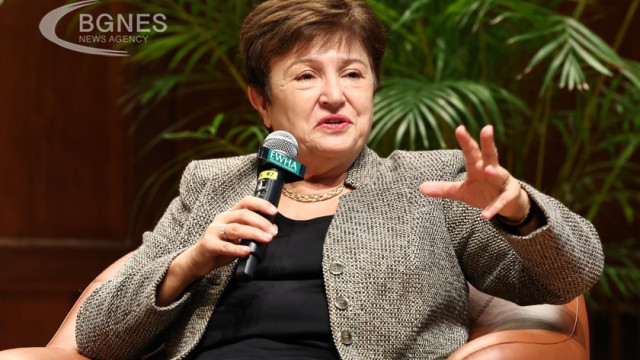Artificial intelligence poses risks to job security around the world, but also offers a "tremendous opportunity" to boost lagging productivity levels and boost global growth, the head of the IMF said in an interview with AFP.
Artificial intelligence will affect 60% of jobs in advanced economies, International Monetary Fund Managing Director Kristalina Georgieva said in an interview in Washington, shortly before leaving for the annual World Economic Forum in Davos, Switzerland.
As artificial intelligence is expected to have less impact in developing countries, about "40 percent of jobs globally are likely to be affected," she said, citing a new IMF report.
"And the more higher-skilled jobs there are, the bigger the impact," she added.
The IMF report, published on January 14, notes that only half of the jobs affected by AI will be negatively affected; the rest can actually benefit from the increased productivity due to AI.
"Your work could disappear completely - which is not good - or artificial intelligence could improve your work, so you would actually be more productive and your income level could increase," Georgieva said.
The IMF report predicts that while labor markets in emerging markets and developing economies will feel less of an initial impact from AI, they are likely to benefit from the increased productivity that will arise from its integration into the workplace. less.
"We need to focus on helping low-income countries, in particular, move faster so that they can capture the opportunities that artificial intelligence will provide," Georgieva told AFP.
"So AI is, yes, a little scary. But it's also a huge opportunity for everybody," she said.
The IMF is due to release updated economic forecasts later this month that will show the global economy as a whole is on track to meet its previous forecasts, she said.
It is "ready for a soft landing," she said, adding that "monetary policy is doing a good job, inflation is coming down, but the job is not quite done."
The global economy could benefit from AI-related productivity gains, as the IMF predicts that it will continue to grow at historically subdued levels over the medium term.
"God, how much we need this," Georgieva said. "If we don't figure out a way to unlock productivity, we as a world are not ready to make great history."
Georgieva said 2024 is likely to be a "very difficult year" for fiscal policy globally as countries seek to deal with debt burdens built up during the Covid-19 pandemic and rebuild depleted reserves .
Billions of people will go to the polls this year, putting additional pressure on governments to increase spending or cut taxes to win popular support.
"About 80 countries will have elections, and we know what happens with spending pressures during election cycles," she added.
According to Georgieva, the IMF fears that governments around the world will spend a lot this year and undermine the hard-won progress in fighting high inflation.
"If monetary policy tightens and fiscal policy expands, contrary to the goal of reducing inflation, we may be in for a longer and more difficult journey," she added.
Georgieva, whose five-year term at the head of the IMF ends this year, declined to answer a question about whether she intends to run for a second time at the head of the international financial institution.
"I have a job to do right now and I'm concentrating on doing it," she said.
"It has been a great privilege to lead the IMF during a very turbulent period, and I can tell you that I am quite proud of how the institution has handled it," she continued.
"But let me finish what is in front of me at the moment"./BGNES







